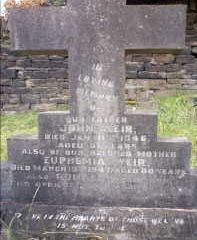John Weir

John Weir was born in 1865 in Crossmyloof, the son of parents born in Ireland, his father a shoemaker. He himself was apprenticed to a blacksmith, at the same time playing football for Wellpark from Dalmarnock at a junior level and then from nineteen with more local and senior Third Lanark.
That was until 1887 when three things occurred. In February he was called up at right- half by Scotland for what would be his only cap, an easy victory over Ireland just down the road at the Second Hampden, Cathkin Park. Then in March, described as a Hammerman, he married Euphemia Simpson. The wedding took place in Glasgow with each giving addresses in Kingston but she originally from Greenock. And finally in the summer the couple, with their first child having been born in July, moved South. They went to Liverpool, specifically to Everton, it unclear whether it was done for football or work.
In fact it was probably to showcase the former in a city where it was in ferment. At the start of the 1887-8 season he turned out for Liverpool Stanley, a team known for the importation of Scots talent, two players from Kilmarnock, Alex Dick and Archie Goodall, already being amongst them. Then he switched to Bootle, which was doing much the same thing. Andrew Watson had also just arrived in much the same amateur-professional limbo. But again Weir did not stay long. By October he was turning out for Everton itself.
He would remain at Anfield, for that was Everton's ground until 1892, for three seasons, by when he had lost his first-team place and was released. But he did not return North. Instead he then took himself, as captain and with the family, a little up the coast to Southport and the town's then other team, High Park. There he is recorded, staying just yards from the club's ground, once more as a Blacksmith/Hammerman and with three children, the son born in Scotland and two daughters in England.
The stay at High Park would be two seasons, at which point it looks as if he received an offer from Rossendale, based in the village of Newchurch, south of Burnley and playing a level up in the Lancashire League. But it was to little effect. The club would remain firmly mid-table until he left in 1895, making at the age of thirty a final move in terms of football, if not life. It took him the short distance to Rawtenstall, the neighbouring village's team, as player-coach, it playing in the Lancashire Combination, essentially the reserve-team league for the surrounding major teams.

And whilst John stayed just a season and Rawtenstall folded in 1898, the personal die seems to have been cast. By 1901, now with eight children, he was working as a Pressman in a local factory making slippers and back at Rossendale, a coach. In 1911 its was the same work, on- and off-field, but with three weans children more and staying in the house next door. And he would continue at the slipper-works well into his seventies, only retiring during WWII to die in 1946 at the age of eighty-one. He is buried in Newchurch's St. Nicholas Churchyard. As for Euphemia, she would outlive him by just a single year, passing away, it seems, back in Greenock but laid to rest beside John in their adopted home-village.
Birth Locator:
Residence Locations:
1871 - Crossmyloof (Eastside), Glasgow
1881 - Pollokshaws Rd., Glasgow
1887 - 54, South Kinning Place, Kingston, Glasgow
1887 - 2, Pulford St., Everton, Liverpool
1891 - 31, Wennington Rd., North Meols, Lancashire
1901 - 18, Old St., Newchurch, Lancashire
1911 - 20, Old St., Newchurch, Lancashire
1921 - N/A
1939-46 - 4, Naze Road, Rawtenstall, Lancashire
Death Locator:
1946 - Moorlands Infirmary, Rossendale, Lancashire
Grave Locator:
St. Nicholas Churchyard, Newchurch, Lancashire
Other Sources
Tony Onslow Article - "The Blacksmith of Crosmyloof"
Back to the Queen's Park & Southern Suburbs Trail
or the SFHG Home page